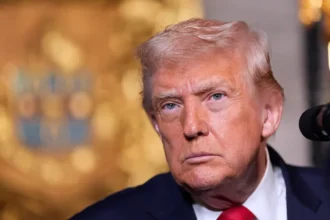President Donald Trump revealed that tariffs on goods imported from China will “come down substantially,” although he clarified they “won’t be zero.” His remarks came in response to recent statements made by Treasury Secretary Scott Bessent, who argued that the current tariff levels are not sustainable.
Earlier Tuesday, Bessent called for a “de-escalation” in the ongoing trade war between the United States and China. He cautioned that prolonged high tariffs were straining both economies and generating uncertainty in the global economy. Trump, on the other hand, avoided outright agreeing with Bessent’s assessment, instead adopting a more guarded tone regarding the long-term prospects.
Trump’s government placed a 145% tariff on Chinese goods, and Beijing responded by imposing a 125% tariff on American exports. These strong steps have startled investors, caused to increased interest rates on US debt, and fueled concerns about inflation and slow economic development.
Although Bessent’s statements were made behind closed doors, they were corroborated by two persons familiar with the situation. According to a transcript acquired by the Associated Press, Bessent stated that neither China nor the United States feel the current situation is sustainable.
Following the initial Bloomberg News coverage of Bessent’s comments, the S&P 500 surged by 2.5%, signaling investor optimism for possible tariff reductions.
During a brief encounter with the media following Paul Atkins’ swearing-in as the next chairman of the Securities and Exchange Commission, Trump appreciated the market gain. However, he remained equivocal about whether he agrees with Bessent that the existing quo cannot continue.
Despite hints of relief, Trump stressed that he will retain a diplomatic approach with Chinese President Xi Jinping. “We’re going to live together very happily and ideally work together,” he stated. Still, he was insistent about maintaining some degree of tariff pressure, stating, “It won’t be that high, not going to be that high.”
China, which has frequently criticized Trump’s trade policies, has not officially commented but responded through state-run media and social platforms. On Weibo, hashtags like “Trump admitted defeat” gained traction, while China Daily labeled the remarks as “populist protectionism.”
Meanwhile, reports from Korean media suggest China may be leveraging pressure on third-party countries. The Korea Economic Daily noted that Beijing warned some Korean firms against supplying U.S. military contractors with goods containing Chinese critical minerals, raising concerns about broader geopolitical fallout.
White House press secretary Karoline Leavitt stated that the United States has received 18 trade offers from other countries. Trump’s administration has been in talks with allies such as Japan, India, and the EU to eliminate what it considers unfair trade barriers.
However, China has advised other countries not to make partnerships with the United States that could damage Chinese interests. Beijing’s Ministry of Commerce released a harsh statement warning against alliances that could weaken its trading stance.
In the midst of this tumultuous backdrop, Trump made headlines by urging that the Federal Reserve slash interest rates and hinted again at the removal of Fed Chair Jerome Powell, though he later backtracked.
Also Read: Harvard University Sues Trump Administration Over $2.2 Billion Funding Freeze









